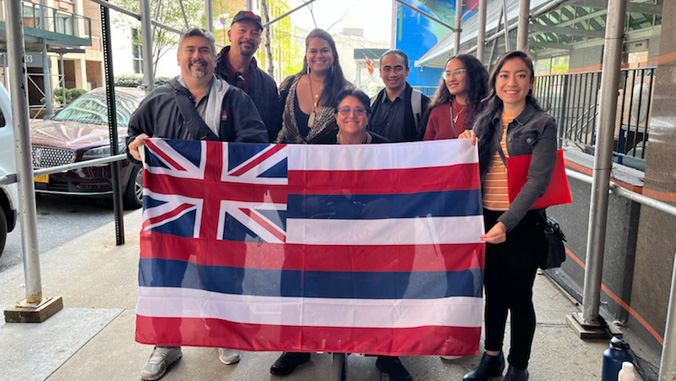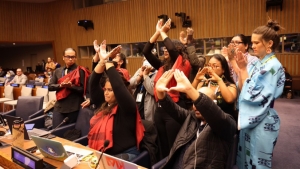
Haumāna (students) from Hawaiʻinuiākea School of Hawaiian Knowledge (HSHK) at the University of Hawaiʻi at Mānoa attending an international forum at the United Nations headquarters in New York City through May 6, are calling on global leaders to take a deeper look into the highly controversial Red Hill fuel leaks that tainted Honolulu’s groundwater aquifer.
Lilikalā Kameʻeleihiwa, a professor at HSHK Kamakakūokalani Center for Hawaiian Studies (KCHS), escorted five haumāna to the Big Apple for the annual United Nations Permanent Forum on Indigenous Issues (UNPFII) beginning in late April. The two-week forum is the central coordinating body for matters relating to the concerns and rights of the world’s Indigenous peoples.
“I bring NH (Native Hawaiian) KCHS students to the UNPFII because if we Hawaiians really want our country back, as do I, then we need to learn the international arena of governments,” Kameʻeleihiwa explained.
MA student Makanalani Malia Gomes and her classmates participated in the Indigenous Youth caucus at UNPFII. Gomes turned heads at UNPFII when she spoke out about the leaking of 14,000 gallons of fuel at a Red Hill facility on her home island and compromised access to clean drinking water.
“At the time when delivering the intervention, I was fully present and wanted to simply be a vessel for these lifeways and waterways,” Gomes explained.

“Our intention was always to honor water as an autonomous being and ancestor. We (those from the team who helped to draft the statement) worked hard the days leading up to the day of the scheduled topic…we knew we wanted to bring up the issue of water, specifically at Kapukakī or Red Hill, to this global platform to set a precedent for other issues related to water like Mauna Kea, but also water issues around the world because we know so many of our Indigenous family are facing similar issues.”
Gomes joined KCHS haumāna Alyssa Purcell, Lahela Mattos, Joseph Awong and Kalani Simeona and Kealiʻi Gora, an administrator at HSHK for Pūkoʻa and Kūaliʻi Native Hawaiian Councils, who has attended events at the U.N. since 1993 and trains students to write interventions in the UNPFII style.
The UNPFII was established in 2000 to address Indigenous issues related to economic and social development, culture, environment, education, health and human rights.
Kameʻeleihiwa has brought haumāna to UNPFII for the last two decades, and the majority of those students have become leaders in the Native Hawaiian community, she said.
“Attending the face-to-face (forum) for two weeks is like a crash course in these matters, and students make lifelong friends,” said Kameʻeleihiwa. “They want to change the world and serve the Lāhui.”
This year, UH Mānoa haumāna crossed paths with Indigenous people from every continent on the planet except for Antarctica. Among a number of issues raised by attendees was the preservation of native languages around the world.
On May 6, the forum’s final day, Kameʻeleihiwa and her students will conduct a virtual presentation showcasing a 9,000-page handwritten genealogy recovery project based on records found at the Hawaiʻi State Archives. The online event will be held at 11:30 a.m. EDT (5:30 a.m. HST). (Register online) or Facebook Live: @hshkuhm.
This work is an example of UH Mānoa’s goal of Becoming a Native Hawaiian Place of Learning (PDF), Enhancing Student Success (PDF) and Excellence in Research: Advancing the Research and Creative Work Enterprise (PDF), three of four goals identified in the 2015–25 Strategic Plan (PDF), updated in December 2020.

